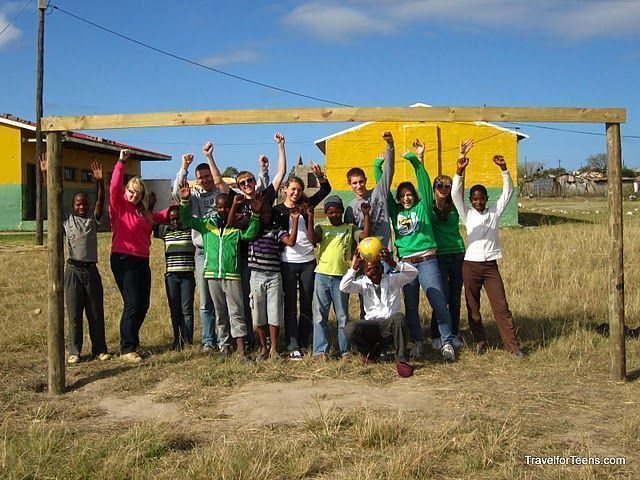Africa: not a Serengeti wonderland of lions and elephants, but a barren landscape of high grass and termite hills. Sawdust careened into my face, guided by petulant gusts of filthy air. Women walked down the dirt road, balancing buckets of water on their heads, as children ran behind in broken sandals and torn shirts. Goats and cattle clogged the streets with their moos and baas.
Days before, I’d stepped off a plane in Johannesburg, expecting to find a country rejuvenated by the World Cup and sixteen years of democratic government. As the World Cup slogan said, “It’s Ayoba Time!”—a time for celebration. But I found a harsher reality.
Finalist 2011 Teen Travel Writing Scholarship
Before I left, friends questioned why I was traveling to South Africa with Travel for Teens to build a playground and donate six hundred soccer jerseys. They remarked, “Is there not poverty in America?” I understood their thinking; I’d be working in Africa’s richest nation while the poverty in Richmond was an hour away. But my perspective quickly changed. In the Xhosa village of Xingxingolo (the X’s pronounced as clicks), I observed poverty unparalleled to America. Running water and cars were nonexistent. Adults were illiterate and lived in houses made of sheet metal, mud, and cow dung; many of them suffered from alcoholism. Children wandered the dusty streets alone, amid wayward goats.
Despite the dire state of their village, the children found hope in their newly constructed school. Kindergartners were not only responsible for their education and learning English, they also took care of siblings and household duties. These children, dressed in hand-me-down Nike shirts from long-gone UNICEF workers, represented the first generation of blacks in South Africa born into the equal-rights government which replaced apartheid.
After many hours of arduous labor for the volunteer group Volunteer Africa 32 South, the playground was completed and the soccer equipment was donated. The school principal explained the difference the playground would make for her students. Without it, teachers encouraged students to play, but they only hid in the shadow of the concrete building. Now, students could build social skills and become leaders in a community of failing parents. The jerseys would be utilized for more than sports. Philanthropists would use the venue of soccer to address greater issues; they planned to create AIDS and clean-water clinics.
I found it odd to think that a playground and a few jerseys could make such a difference. Then, I realized the flaw in my pre-conceived view of Africa. I thought that the influence of Mandela, Desmond Tutu, and the glory of the World Cup would be a panacea for the continent’s problems. I thought that my efforts would cause only a ripple, destined to go unnoticed. But I now understand that there’s no single solution for South Africa’s issues; there’s no proclamation or amount of money that can immediately cure decades of wrongdoing. Little efforts will slowly raise the country out of the shadow of crime, poverty, and disease.
Before the trip, I planned to enter the Peace Corps after college to “change the world” and solve problems with a single motion. While my desire to join the Peace Corps remains unchanged, my goals are different. I now know that if I can influence just a few people in one small village, the seeds of change will be planted and it will truly become “Ayoba Time.”
Dear Reader: This page may contain affiliate links which may earn a commission if you click through and make a purchase. Our independent journalism is not influenced by any advertiser or commercial initiative unless it is clearly marked as sponsored content. As travel products change, please be sure to reconfirm all details and stay up to date with current events to ensure a safe and successful trip.
